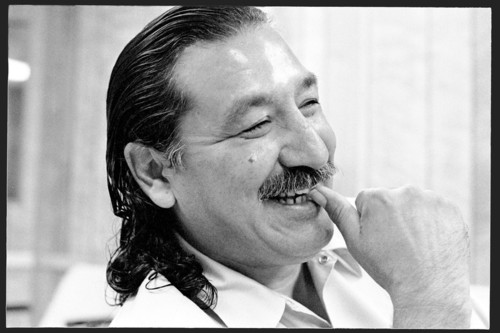
Leonard Peltier was a leading member of the American Indian Movement (AIM), an activist group that was involved in promoting the rights of “traditionalist” Indians during a period of intense conflict in the 1970s. On June 26, 1975, during a confrontation involving AIM members on the Pine Ridge Indian reservation in South Dakota, FBI agents Ronald Williams and Jack Coler were shot dead.
Leonard Peltier was convicted of their murders in 1977 and sentenced to two consecutive life sentences. Leonard Peltier does not deny that he was present during the incident. However, he has always denied killing the agents as was alleged by the prosecution at his trial. Here are 5 reasons he should be released:
1) A key alleged eyewitness to the shootings was Myrtle Poor Bear, a Lakota Native woman who lived at Pine Ridge. On the basis of her statement that she had seen Leonard Peltier kill Ronald Williams and Jack Coler, Leonard Peltier was extradited from Canada, where he had fled following the shootings. Although Myrtle Poor Bear later retracted her testimony, the trial judge refused to allow Leonard Peltier’s attorneys to call her as a defense witness on the grounds that her testimony “could be highly prejudicial to the government.” In 2000, Myrtle Poor Bear issued a public statement to say that her original testimony was a result of months of threats and harassment from FBI agents.
2) In 1980, documents were released to Leonard Peltier’s lawyers as a result of a lawsuit under the Freedom of Information Act. The documents contained evidence which might have assisted Leonard Peltier’s case, but which had been withheld by the prosecution at trial. However in 1986, the U.S. Court of Appeal for the Eighth Circuit denied Leonard Peltier a retrial, stating that: “We recognize that there is some evidence in this record of improper conduct on the part of some FBI agents, but we are reluctant to impute even further improprieties to them.”
3) In 1991, Gerald Heaney, the judge who presided over Leonard Peltier’s 1986 appeal hearing, expressed his concerns about the case. In a letter to Senator Daniel Inouye, chair of the Senate Select Committee on Indian Affairs, Gerald Heaney wrote that he believed “the FBI used improper tactics in securing Peltier’s extraction from Canada and in otherwise investigating and trying the Peltier case.” He added: “Although our Court decided that these actions were not grounds for reversals, they are, in my view, factors that merit consideration in any petition for leniency filed.”
4) The U.S. Parole Commission has held a number of parole hearings on Leonard Peltier’s case. However, it has always denied parole on the grounds that Peltier did not accept criminal responsibility for the murders of the two FBI agents. This is despite the fact that, after one such hearing, the Commission acknowledged that “the prosecution has conceded the lack of any direct evidence that you personally participated in the executions of two FBI agents.”
5) Leonard Peltier is currently imprisoned in Florida, approximately 2,000 miles from his family in North Dakota. It is a physical hardship for his family to visit him, and almost impossible financially. As a result, he is very rarely visited by his loved ones. Leonard Peltier is now aged 69 and in poor health, suffering from diabetes, among other things.
In sum, Amnesty International has studied his case extensively over many years and remains seriously concerned about the fairness of proceedings leading to his trial and conviction. Amnesty believes that political factors may have influenced the way in which the case was prosecuted.
Leonard Peltier’s most recent petition for release on parole was denied by the U.S. Parole Commission in 2009, and Amnesty understands that he is not eligible for consideration for parole again until 2024.
Given that all available legal remedies have been exhausted and that Leonard Peltier has now spent more than 36 years in prison, Amnesty believes that in the context of these ongoing concerns, the U.S. authorities should order Leonard Peltier’s release from prison on humanitarian grounds and in the interests of justice.
Take action: Urge President Obama and Charles E. Samuels Jr., Director Federal Bureau of Prisons, to free Leonard Peltier.
